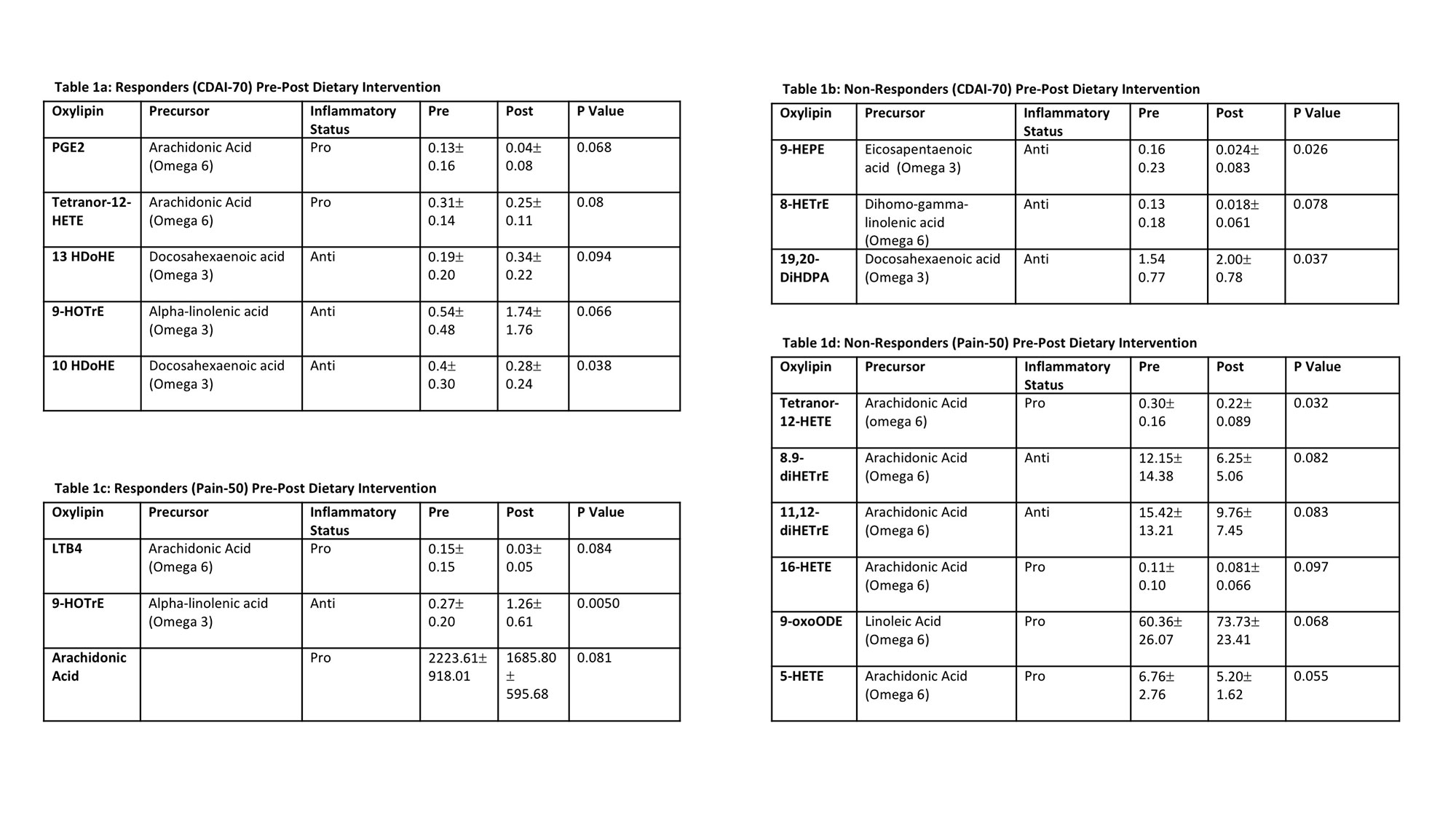Session Information
Date: Monday, November 14, 2022
Title: RA – Treatment Poster IV
Session Type: Poster Session D
Session Time: 1:00PM-3:00PM
Background/Purpose: Rheumatoid arthritis (RA) is an autoimmune disease that causes joint pain, swelling, stiffness, and decreased mobility. Despite the various treatment options for RA, many patients fail to achieve sustained remission. In recent years, there has been increased interest in using dietary modifications to help treat RA. It is theorized that dietary interventions can change circulating levels of oxylipins. Oxylipins are omega-6 and omega-3 derived bioactive lipids involved in the development and resolution of inflammation. In this study, we investigated the impact of an anti-inflammatory diet on oxylipin plasma profile in patients with RA.
Methods: This study was an open-label pilot trial. The primary objective of the study was to evaluate the impact of a 2-week anti-inflammatory diet (ITIS) on pain and inflammation in patients with RA. Data on patients’ diet and disease activity were collected at three visits. The diet was initiated on the second visit. A physical exam was performed and blood samples from patients were obtained at each visit. Targeted lipidomics on plasma samples by mass spectrometry was performed to identify and quantify oxylipin concentrations. Patients were categorized as responders (R) and non-responders (NR) to the diet using two metrics: a 50% improvement in pain and a 70% reduction in clinical disease activity (CDAI-70) following the dietary intervention. Data processing and statistical analysis were performed in R.
Results: 20 patients with active RA (≥ 3 tender and ≥ 3 swollen joints) were enrolled in the study. 90% of the participants were female and the average age of participants was 57.1. Pain improved significantly from 3.90± 1.96 (pre-diet) to 2.49 ± 2.20 (post-diet) (p=0.0036), while CDAI improved from 18.40 ± 9.49 (pre-diet) to 12.68 ± 11.13 (post-diet) (p= 0.00017). At baseline, CDAI-70 R had higher levels of the anti-inflammatory oxylipin 7, 17 dHDPA than NR, while pain-50 R had higher levels of pro-inflammatory oxylipins PGD1 and 9-oxoODE, and lower levels of the anti-inflammatory oxylipin 9-HOTrE than NR. Post-intervention, as shown in Table 1, CDAI-70 R had significant decreases in the pro-inflammatory oxylipins PGE2, tetranor-12HETE, and anti-inflammatory 10HDoHE, and significant increases in the anti-inflammatory oxylipins 9-HOTrE and 13HDoHE , while CDAI-70 NR exhibited decreases in pro-inflammatory 8-HETrE, decreases in anti-inflammatory 9-HEPE, and increases in anti-inflammatory 19,20-DiHDPA. Pain-50 R exhibited significant decreases in pro-inflammatory LTB4, and a significant increase in anti-inflammatory 9-HOTrE, while Pain-50 NR exhibited decreases in pro-inflammatory oxylipin tetranor-12-HETE and 5-HETE and increases in anti-inflammatory 8,9-diHETrE, 11,12-diHETre, and 9-oxoODE.
Conclusion: Multiple pro- and anti-inflammatory oxylipins changed from before to after the diet, suggesting that dietary interventions can impact circulating oxylipin concentrations. Of note, different omega-3 and omega-6 derived oxylipins changed when patients were categorized by pain and CDAI changes, and by responders and non-responders. Further investigations evaluating the specific pathways by which dietary interventions modify disease activity are needed.
(R) and non-responders (NR) based on a 50% improvement in pain (Pain-50) or a 70% reduction in clinical disease activity (CDAI-70) Oxylipin
concentrations pre-and post-dietary intervention were compared in R and NR using a paired t-test. A) Differences in oxylipins pre-and-post
dietary intervention in CDAI-70 responders; B) Differences in oxylipins pre-and-post dietary intervention in CDAI-70 non-responders; C)
Differences in oxylipins pre-and post dietary intervention in Pain-50 responders; D) Differences in oxylipins pre-and-post dietary intervention in
Pain-50 non-responders.
To cite this abstract in AMA style:
Lal E, Sala Climent M, cedola f, Fernandez-Bustamante M, Agustín-Perez M, Alharti M, Singh A, Choi S, Rivera T, Nguyen K, Lee S, Armando A, Holt T, Quehenberger O, Golshan S, Coras R, Guma M. Changes in Omega-6- and Omega-3-Derived Bioactive Lipids in Response to an Anti-Inflammatory Dietary Intervention [abstract]. Arthritis Rheumatol. 2022; 74 (suppl 9). https://acrabstracts.org/abstract/changes-in-omega-6-and-omega-3-derived-bioactive-lipids-in-response-to-an-anti-inflammatory-dietary-intervention/. Accessed .« Back to ACR Convergence 2022
ACR Meeting Abstracts - https://acrabstracts.org/abstract/changes-in-omega-6-and-omega-3-derived-bioactive-lipids-in-response-to-an-anti-inflammatory-dietary-intervention/

